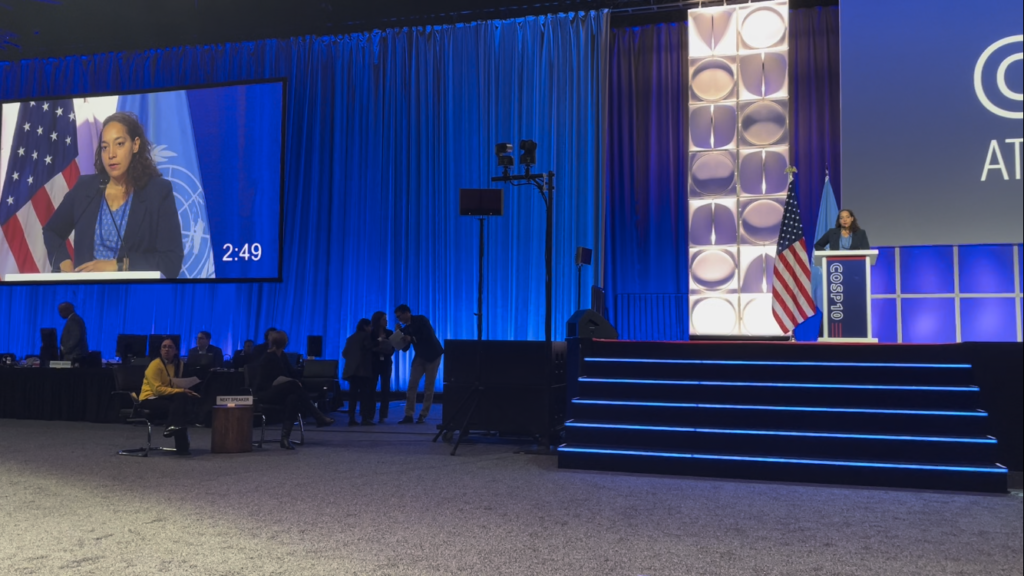On December 12, the 10th Conference of the States Parties (CoSP 10) to the UN Convention Against Corruption (UNCAC) continued with its second day. Delegates of States parties continued to make remarks in front the plenary session before representatives of NGOs and civil society organizations were invited to do the same.
National Whistleblower Center (NWC) was among the NGOs and civil society groups invited to give a statement before the plenary session. NWC Executive Director Siri Nelson took the stage to advocate for whistleblower rights as a key tool in UNCAC’s efforts to combat corruption.
“So far this week, we’ve heard about a lot of different approaches to anti-corruption, however it is critical to remember that whistleblowers are the infantry of the anti-corruption effort,” Nelson said. “Whistleblowers are critical at every step and whistleblowers must be included in every single discussion we have about fighting corruption.
“Whether it be identifying the real use of assets, to identifying where bribery occurs… whistleblowers are the key to uncovering the evidence needed for successful prosecutions,” Nelson continued. “This is an empirically supported fact: whistleblowers are better at uncovering crime than any other mechanism we have.”
Nelson went on to advocate for a UNCAC whistleblower resolution which lays out a set of best practices for whistleblower programs. The model suggested by NWC was further laid out in their written statement for CoSP10.
NWC’s written statement explains that “States Parties must enact best-practice whistleblower programs and/or educate their citizens on how to use transnational whistleblower programs of other States. NWC has identified three essential components of an effective whistleblower program: Anonymity, Compensation, and Enforcement (or the “ACE” model):
- ANONYMITY–Guarantee that whistleblowers can report corruption anonymously.
- COMPENSATION–Provide whistleblowers whose claims result in a successful sanction with monetary rewards consisting of 10-30% of the sanction levied.
- ENFORCEMENT–Quickly and effectively punish/sanction guilty persons/entities based on whistleblower claims, collaborating between agencies and internationally.”
According to NWC, these components are found in the United States’ Dodd-Frank Act, the law which established the SEC Whistleblower Program, and have been lauded by the Organisation for Economic Co-operation and Development (OECD) as best practices.
“NWC has witnessed the success of this model in combatting transnational corruption,” the written statement continues. “The guarantee of anonymity protects whistleblowers and decreases concern regarding retaliation. High monetary rewards reduce the financial risk incurred through blowing the whistle. Due to these factors, the Dodd-Frank program alone has resulted in over 6,000 tips from whistleblowers outside of the United States.”
“It was an incredible honor and opportunity to speak before the plenary session of CoSP10,” said Nelson. “Whistleblowers are at the core of any effective anti-corruption effort and it was important to be able to center them in a statement on the main stage. I hope that delegates will take note of our outlined best practices and adopt a whistleblower resolution of real substance.”
CoSP10 Whistleblower Resolution Remains in Flux
On December 12, closed-door discussions of proposed draft resolutions continued. Among these draft resolutions are two centered on whistleblower protections. By the end of the day, delegates of Serbia and Palestine, the countries who proposed the draft whistleblower resolutions, had agreed to merge their resolutions.
The language of this merged draft resolution has yet to be released. Notably, while Palestine’s draft resolution contained language on whistleblower awards, Serbia’s did not. It remains to be seen whether this language will be included in the merged resolution.
Further Reading:
CoSP10 Commences with Strong Statements and Resolutions on Whistleblowing
Approaching CoSP10, Civil Society Urges Focus on Whistleblowing
